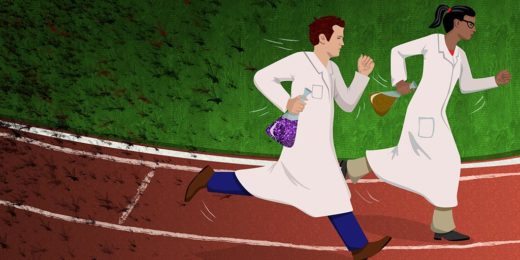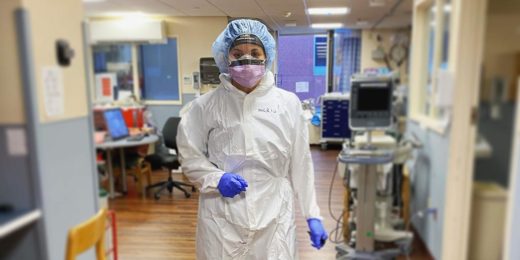Stanford experts provide tips for helping young children learn to wear a cloth mask to help prevent the spread of COVID-19.
Month: June 2020
How remdesivir works, and why it’s not the ultimate coronavirus killer
How exactly does the antiviral drug remdesivir counter SARS-CoV-2 – the coronavirus strain responsible for COVID-19? And how well?
Life After Shelter In Place: Part II
Dean Lloyd Minor of Stanford Medicine describes the key elements that must be in place for society to reopen safely during the COVID-19 pandemic.
Understanding the biological clock of pregnancy
Stanford scientists have built a detailed picture of the biological clock of pregnancy, tracking thousands of metabolic markers throughout gestation.
Antibiotic resistance and other things you need to know about UTIs | Understanding UTIs, Part 7
This final post in the Understanding UTIs series addresses antibiotic resistance and provides a wrap-up of key points to remember.
The race for a COVID-19 vaccine: What’s ahead
A Stanford microbiologist describes the invigorating, yet sobering race to develop an effective vaccine against COVID-19.
AI predicts effective depression treatment based on brainwave patterns
Tracking brainwave patterns and symptoms in patients with depression, researchers used artificial intelligence to predict best treatment options.
Risk of suicide is much higher among handgun owners, study says
A comprehensive Stanford study of data on California gun sales and first-time gun owners shows a link between suicides and handgun ownership.
Stanford surgeon repurposed her suturing skills to sew hundreds of masks
Stanford pediatric surgeon Janey Pratt converted her dining room to a factory, in order to produce cloth masks to protect people from COVID-19 transmission.
Remembering William Dement: Squirt guns, a golf cart and an unforgettable spirit
Known as the “father of sleep medicine,” long-time Stanford Medicine faculty member William Dement is remembered for his charm, quirkiness and generosity.
Men can get urinary tract infections | Understanding UTIs, Part 6
This sixth post in the Understanding UTIs series clarifies that anyone — even men, children or pregnant women — can get a urinary tract infection.
Some anxiety, insomnia drugs raise risk of ectopic pregnancy
Taking benzodiazepines within 90 days before conception raises the risk of a life-threatening condition known as ectopic pregnancy, according to a study.
COVID-19 in New York: Stanford volunteers provide care, support
When New York's COVID-19 patient numbers and deaths were spiking, these three Stanford health workers headed to the city to provide care and support.
‘You are the leaders of tomorrow, forged in the crisis of today.’
At the Stanford School of Medicine's virtual graduation ceremony, speakers told newly-minted health professionals that they can make a difference.
How to stay safe as COVID-19 orders are relaxed
Stanford Health Care chief of staff Megan Mahoney, MD, answers questions about how to avoid the spread of COVID-19 as restrictions are loosened.
Proximity to oil and gas wells linked to prematurity risk
Living near an oil and gas well in California's San Joaquin Valley during pregnancy is linked to increased risk of spontaneous preterm birth, finds Stanford study.

















